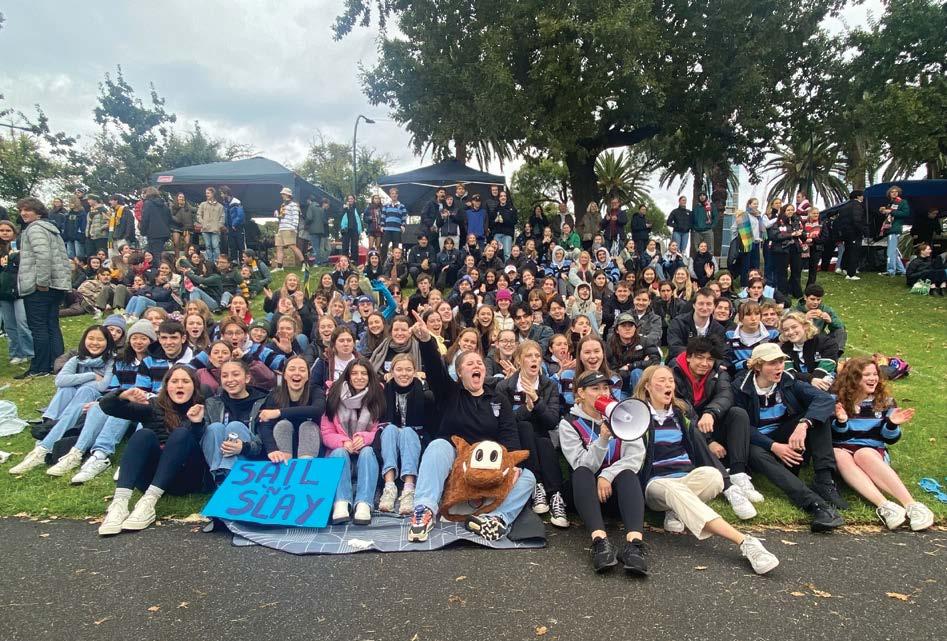
4 minute read
First Nations history
First Nations history –a sense of place across time
In March 2022, Head of College, Dr Jennifer McDonald, invited Wurundjeri Elder, Uncle Bill Nicholson, and his partner Aunty Cathy, to deliver a Welcome to Country (Tanderrum) and to perform a smoking ceremony at the College’s commencement reception. This was a first-time honour for the UC community and an important step towards acknowledging the history of our country and respecting the land on which the College stands.
Advertisement
In delivering his welcome, Uncle Bill invited us to the land of the Wurundjeri people and asked to join and unite with the Traditional Owners of this land in the spirit of mutual respect. Following his visit, we asked Uncle Bill to tell us more about the First Nations Peoples who are known to have lived and learned through kinship and story on this site for over 65,000 years: The lands that University College is located on are the lands of the Wurundjeri people, who have lived and thrived on this landscape for thousands of years. It’s difficult to know what the exact Wurundjeri population was before the colonial invasion, but what we do know is, with the lores of the land dictating the populations, it was very much in sync with what the land could provide. Wurundjeri land was one of the most fertile areas of the whole continent, which allowed for one of the highest populations of Aboriginal people in what is now called Australia. The smallpox epidemic of 1803 devastated Wurundjeri’s structured society, followed by the arrival of Batman’s people and the introduction of cattle, sheep, pests, and weeds, the impacts of which still resonate to this day. Wurundjeri numbers declined so fast that eventually only 18 Wurundjeri people were recorded by the government in 1863. Wurundjeri people have a very special connection to the land and are connected to a larger family structure now called the Kulin Nation, taking up most of Central and South-Central Victoria. This connection to country is felt on both a physical and spiritual level. Meaning, that life is fulfilled through an understanding of, and responsibility towards, the physical and spiritual world, including flora and fauna and the Earth’s energies and gifts from Bunjil, like water and fire. Lore dictated that we are not above the world around us but responsible for it. This is the responsibility we would like everyone to take on today, to care for this sacred land and respect each other. This lore was never ceded and never will while Wurundjeri people are still here. Wurundjeri Elder, Uncle Bill Nicholson Jnr
From then to now
Dr Margaret Williams (later WilliamsWeir), a member of the Malera/ Bandjalang People in northern New South Wales, made history in 1959 when she became the first Aboriginal graduate of an Australian university. While studying at the University of Melbourne she was a resident at University (Women’s) College, where she was supported by funds from the Australian Heads of Colleges Association. Current UC third year student Kaytlyn Johnson is a proud Palawa woman from Wynard, Tasmania. She has won several awards for her leadership (including the 2022 Tasmanian Young Australian of the Year); inspiring young people to develop new skills, connect with their community and campaign for change. She is a recipient of the Ann Miller Indigenous Scholarship. We are proud to have supported indigenous students throughout our history, and will continue to improve our support in the future. “I know, as a student from an area with limited opportunity, that we have just as much potential as students elsewhere… You don’t have to do what everyone else is doing. You CAN break the trend and you CAN be the first to accomplish something, because the proposed limits that are perpetuated onto young people in our areas do not exist.” Kaytlyn


The Ann Miller Indigenous Scholarship
In 2008 Ann established a scholarship for a student at University College. Originally it was available to any student studying any discipline. However, when Ann attended the Scholars Dinner in 2014, the keynote speakers were two indigenous women: Dr Margaret Williams-Weir and Dr Misty Jenkins, resident adviser in 2006. Both were from rural Australia, were first generation university women and had successful careers.
“A few days after this dinner I contacted College to begin discussions about changing the scope of my scholarship so I could support other indigenous people to fulfil their dreams. My scholarship is now for an indigenous woman, studying any discipline at the University of Melbourne and supports the duration of their stay in College. I have established a happy relationship with each of these young women and it has been (and still is) a joy to watch their development.” Ann Miller








